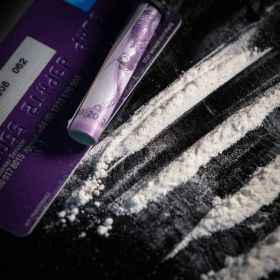Alcoholism Signs,
Symptoms, & Treatment
Alcohol Addiction Treatment in Los Angeles
Alcohol addiction is a complex yet serious issue that can have devastating effects on an individual’s life. From strained relationships to financial hardship and health complications, alcohol dependence can cause people to feel as if they are losing control of their lives. Fortunately, there is help available through effective alcohol rehab in Los Angeles, California. With the right support and treatment plan, individuals struggling with alcohol use disorder (AUD) can start down the path toward recovery.

Understanding Alcohol Use Disorder
Once people reach 21 years old in the U.S., alcohol is legal and easily available. Furthermore, they don’t have to look hard to find a place that serves alcohol. Beer, wine, and liquor/spirits are big money makers for grocery stores, gas stations, restaurants, sporting events, and other establishments.
Social drinking is a part of many cultures, and it can be safe if done responsibly. However, when alcohol consumption becomes excessive and begins to interfere with someone’s life, it may be indicative of an alcohol addiction or abuse problem. Binge drinking – defined as having four or more drinks in a single sitting for women, and five or more for men – is particularly hazardous. Consequently, leading to an increased risk of physical injury and developing a dependence on alcohol.
Alcohol addiction is a serious and potentially life-threatening condition that affects millions of people worldwide. While social drinking is legal and widely accepted across cultures, excessive alcohol consumption can lead to a range of health problems, damaged relationships, and even legal issues. It’s important to recognize the signs of alcohol addiction and understand the risks associated with it.
In the short term, alcohol impairs memory and vision and reduces coordination. Prolonged drinking can lead to dependence on the substance. This means the person will feel withdrawal symptoms if they don’t get their next drink within 8 to 24 hours after the last one.
Signs of alcohol dependence include:
- Unable to limit drinking
- Continuing to drink despite harmful consequences
- Needing to drink more to achieve the same effect
- Consumed by thoughts of having a drink
The severity of withdrawal symptoms and timing depends on many factors including the amount of alcohol they typically consume. Alcohol withdrawal is potentially life-threatening in many cases. Therefore, self-detox is never recommended.
Possible withdrawal symptoms include:
- Nausea and Vomiting
- Excessive Sweating
- Hallucinations
- Seizures
- Headaches
- Anxiety
- Insomnia
- Fatigue
- Delirium tremens (DTs)
- Increased heart rate
- High blood pressure
The Centers for Disease Control and Prevention warns that consuming large amounts of alcohol can result in serious health concerns. In the United States alone, excessive alcohol consumption led to over 140,000 deaths and 3.6 million years of potential life lost from 2015 to 2019. In fact, the average life expectancy for those who died due to excessive alcohol use was shortened by 26 years.
Furthermore, one in every five deaths for adults between the ages of 20 and 49 years was caused by excessive drinking.
Continued heavy drinking over several years leads to serious health consequences, such as:
- Increased risk of cancer
- Liver disease
- Impaired memory
- Damaged speech, vision, or muscle tone
- Neuropathy – weakness, and numbness of the hands and feet
- Wernicke-Korsakoff Syndrome (wet brain) – amnesia and dementia due to severe deficiency of thiamine
- Cardiovascular disease
- Mental health disorders

Call Us 24/7: (855) 652-9048
We are an in-network provider with Anthem, First Health Network, Multi-Plan, Beacon, HMC, Humana, Aetna
Why Do Some People Develop Alcohol Use Disorder?
Alcohol use disorder, also known as alcoholism, is a chronic disease characterized by the excessive and uncontrollable consumption of alcohol despite its negative consequences. Alcohol addiction permeates all races, genders, and socioeconomic classes in the United States. Therefore, while some individuals maintain responsible drinking habits, others struggle with addiction. So, why do some people develop alcohol use disorder and not others?
Many factors contribute to the development of alcohol use disorder. Some prominent factors for predicting who might be at risk of becoming addicted to alcohol include:
- Genetics – is a family history of alcohol abuse or addiction
- Upbringing – if someone grew up around family members who drank heavily and didn’t discourage alcohol use
- Certain personality traits – impulsivity and a tendency toward risk-taking behaviors
- Social environment – surrounded by friends and/or coworkers who drink often; living close to several bars
- Existing mental health issues – some people turn to alcohol to try to manage the symptoms of mental health disorders
- Personal behavior – heavy drinking, binge drinking, and underage drinking
- Trauma and stress – as a way of coping with unresolved trauma and daily stress
In conclusion, alcohol addiction can develop for various reasons, including genetics, environmental influences, and personal behavior. So, understanding the factors contributing to alcohol addiction can help individuals struggling with the disease seek the treatment they need, such as alcohol rehab in Los Angeles, to overcome their addiction and achieve lasting recovery. Call the Harmony Place 24/7 hotline for help at (855) 652-9048.
Alcohol abuse and addiction are major problems in the United States. According to the National Survey on Drug Use and Health (NSDUH), an estimated 28.6 million adults ages 18 and older in the United States had alcohol use disorder (AUD) in 2021.
AUD is a chronic relapsing brain disorder characterized by an impaired ability to stop or control alcohol use despite adverse social, occupational, or health consequences. AUD can range from mild to severe, and if left untreated, it can lead to serious health consequences, including liver disease, heart disease, and cancer.
One of the main risk factors for developing AUD is binge drinking, defined as consuming a large amount of alcohol in a short period. The NSDUH reported for 2021 that 60.0 million people (or 45.1%) aged 12 and older had engaged in binge drinking in the past month. Binge drinking is particularly common among young adults aged 18 to 25, with 9.8 million people (or 29.2%) reporting binge drinking in the past month.
Alcohol abuse and addiction not only affect the individual but also have a significant impact on society. The National Institute on Alcohol Abuse and Alcoholism (NIAAA) estimates that alcohol misuse and related problems cost the United States $249 billion annually in lost productivity, healthcare expenses, and criminal justice costs.
Preventing and treating AUD requires a multifaceted approach that includes education and awareness campaigns, screening, and interventions, as well as access to evidence-based treatment for those who need it.
How is Alcohol Addiction Treated?
Alcohol addiction is treated by a combination of counseling, medication, and lifestyle changes. Counseling can include psychotherapy to help the individual identify triggers for alcohol abuse and develop strategies to address these challenges. In addition, medications may be used to reduce cravings, minimize withdrawal symptoms, and provide other therapeutic benefits while preventing relapse.
Lifestyle changes such as avoiding potential triggers or high-risk situations that can lead to drinking are important to maintaining sobriety. Additionally, participation in support groups such as Alcoholics Anonymous (AA) can help those suffering from alcohol use disorder develop the social skills needed for successful recovery. Accordingly, treatment should be tailored to the individual’s needs and situation, so it may include multiple components or a combination of different therapies.
The duration of treatment varies depending on the severity of the addiction. But, in general, a long-term recovery program is more successful than short-term interventions. Treatment plans are important for relapse prevention and maintaining sobriety. To ensure effective recovery from alcohol use disorder, individuals must be willing to make changes in their lives and stick with their treatment plan even after they have achieved sobriety.
It is important to remember that although an individual may abstain from drinking alcohol, they may still experience cravings or triggers which could lead them back into active use. Relapse prevention should be addressed with support and assistance. So, sustained involvement in recovery programs is essential for long-term sobriety. Finally, family and friends of those struggling with alcohol use disorder can offer encouragement and guidance to their loved ones during the treatment process.
Harmony Place is a renowned alcohol and drug rehab center based in Woodland Hills, a picturesque suburb of Los Angeles. We offer a wide range of evidence-based treatment programs for individuals at different stages of addiction. Harmony Place adopts a holistic approach to treatment by addressing the physical, emotional, and mental health needs of each client. Our center has cemented its position as one of the top drug and alcohol rehabs in Los Angeles due to our personalized and client-centered approach to addiction treatment.
Addiction treatment methods have evolved significantly over the years, and Harmony Place is at the forefront of this. So, rather than conforming to traditional drug addiction treatment classifications, Harmony Place provides highly diversified programs that are tailored to meet the unique needs and preferences of each client. Moreover, our treatment plans are based on rigorous scientific research and the latest best practices in the field of addiction treatment.
The journey toward recovery often starts with detoxification and medical-managed withdrawal, which helps to control the physiological and psychological effects of stopping drug abuse. Harmony Place, however, takes this a step further, providing comprehensive and integrated treatment that not only addresses addiction but also the client’s mental health. This approach recognizes that treating addiction without considering the client’s mental health may not yield desirable or sustainable outcomes.
Harmony Place is committed to providing a compassionate and nurturing environment that promotes healing and recovery. Our highly-trained and compassionate team works tirelessly to support clients as they embark on the path to addiction recovery. Overall, Harmony Place is an excellent choice for anyone seeking effective, evidence-based, and personalized alcohol addiction treatment in Los Angeles.
Additional Resources
FAQs About Alcohol Addiction Treatment
If you still have any questions about alcohol addiction and the treatment thereof, see if we have your answers in these alcohol FAQs below or call us to learn more:
Alcohol abuse and alcohol addiction are not the same things. If someone is addicted to alcohol, they have both a physical and psychological dependence on it. As with other addictive substances, they build up a tolerance to it, meaning that it consistently takes more alcohol to achieve the effects they are used to.
If someone who is addicted to alcohol stops drinking, they experience withdrawal symptoms and cravings. Most will continue to drink despite the negative impact it has on nearly every aspect of their life.
Alcohol abusers may not drink consistently, but when they do, they drink enough to cause problems for themselves and others, such as:
- Poor decision making
- Risky behavior
- Drinking to the point of sickness
- Alcohol poisoning
Someone who abuses alcohol is usually a heavy drinker, but not necessarily a frequent drinker, who continues to consume the substance even when it negatively affects them.
There is a fine line between casual drinking and addiction – so fine that people who abuse alcohol or drink daily often become addicted. Some of the signs of alcohol addiction include:
- Once they start drinking, they can’t stop.
- They recognize that they need to cut back or stop altogether.
- They’ve tried to stop drinking but experience unpleasant withdrawal symptoms.
- Friends and family have voiced concerns about their drinking.
- They feel guilty or try to hide their drinking.
- They experience blackouts or memory lapses when drinking.
- Alcohol is affecting their job, family, and relationships.
- They have health issues due to overconsumption of alcohol.
Here’s a typical scenario when an addiction is likely developing:
Someone is acting strange, and loved ones can’t quite put their finger on it. Recently, they stopped affiliating with the usual people. Their hours at work have changed, keeping them away from home more often. When they are home, they demand to be by themselves, taking long periods of time in the bathroom, locked away in a study, or sleeping in the bedroom. None of their normal activities seem to interest them, and when others bring that up, they don’t seem to care.
As concerns grow, loved ones ask more questions, which infuriates them. They argue about being entitled to privacy about how they spend their time. Small quirks and behaviors lead their family and friends to believe they are unwell. They seem sick more often and are constantly tired, exhausted, sniffling, and falling asleep during untimely moments. Also, they frequently visit doctors and pharmacies or are just “out” during these times.
Increasingly, people feel like they are being pushed out of their loved one’s life by an imaginary wall they cannot see. Sadly, the wall is addiction. These personality and lifestyle changes are signs that a loved one might be abusing drugs or alcohol, and it’s having a negatively destructive impact on their life.
What to do if a Loved One Shows these signs?
When alcohol addiction starts to spiral out of control, it is a mirror for shame spiraling out of control. The more painful shame someone feels for being out of control, the more out of control they will become. Rather than push someone further away, approach with caution, love, and honesty – and follow these tips:
- Try not to judge, criticize or punish a loved one for what they’ve been doing. Why they’ve developed an addiction has little to do with others. In treatment, they will spend copious amounts of time investigating the underlying causes of their addiction.
- Confront the situation with honesty and love, as with any other issue in their life. No one can fix or stop their addiction for them. This is the time to use statements such as, “I love you,” “I know what’s going on,” and, “We are going to find help.”
- Expect resistance and hysteria in the name of addiction. The erratic behaviors are efforts to protect their addiction by hiding the truth and pushing their delusional reality that they need drugs or alcohol and can manage it.
- If a loved one says they are ready for help, be prepared to help. Before confronting the loved one, call insurance to find out about their behavioral health coverage. Make a list of desirable treatment facilities, and if necessary, make the choice for a loved one.
When someone realizes they are addicted to alcohol, it is scary to open up to friends. These are four of the most common reactions someone is likely to experience:
They Already Knew
True friends will recognize when a friend isn’t being themself. Rather than telling friends that they were having a problem, their friends were telling them. After what might have been months or even years of friends encouraging them to get help, they are finally seeking treatment.
They Had No Idea
Alcoholism can be well hidden. Studies have revealed that most Americans are unaware of how much they drink, as well as how much they are supposed to drink. Someone may catch many friends
by surprise with news of their alcoholism. Some weren’t sure how bad the problem might be. Yet, because they are friends, they encourage them to keep recovering and staying sober.
They Don’t Think There is a Problem.
OWhen someone openly tells their friends it is a major step in recovery. Vulnerable, honest, and raw, it’s a moment of heightened emotional sensitivity. How their friends react will leave a lasting imprint on their recovery.
Damaging responses in this situation would sound like this:
- “You’re not an alcoholic.”
- “You don’t look like an alcoholic.”
- “You don’t act like an alcoholic.”
- “You can’t be an alcoholic.”
Typically, when people are in denial of a friend’s problem with alcohol, they are masking a problem of their own. Don’t look at these friends to give the love, support, and inspiration needed throughout time in treatment or for the rest of sober living.
You Don’t Have Friends Anymore
The ultimate mark of alcoholism is having only alcoholic friends. Regulars at the bar start to feel like family when they are all you have. When you finally get sober, you might find that those “friends” don’t want to talk to you, hang out with you or be around you anymore. If you aren’t drinking, how could they be around you?
The party isn’t over when you get sober. You’re about to have more fun than you’ve probably had in a long time. Though drinking and drug use can be and usually is fun for a while, it isn’t so fun when full chemical dependency takes over. Withdrawal symptoms, cravings, and perpetual sickness aren’t much of a party.
Making the most out of a social occasion isn’t so hard to do when drugs and alcohol aren’t involved. It is always a good idea to avoid places that may trigger the urge to drink and cause a relapse. If someone must attend a social function where alcohol is available, it could help to have a supportive friend or family member tag along
Here at Harmony Place, we understand that struggles with alcohol often co-occur with mental health disorders. We’ve found that many individuals with mental disorders go undiagnosed and untreated, leading to their need to self-medicate. Because alcohol is so accessible, it is the first choice for many who are suffering from depression, anxiety, and other mental health disorders.
Common mental health conditions found in conjunction with alcohol abuse include:
- Depression (all forms, including bipolar disorder and dysthymia)
- Anxiety (including panic disorders)
- Trauma Issues (including PTSD)
- Eating Disorders (especially binge eating; we have an eating disorder specialist on staff)
- Phobias
- Obsessive-compulsive disorder (OCD)
Though widely misunderstood, it is not often the alcohol itself that causes alcoholism. Of course, alcohol does play a large role. However, it is not the only contributing factor. Numerous underlying issues of genetics, psychology, and environment are at play as well.
Alcoholism Is Hereditary
Some are predisposed to alcoholism. There is a genetic reason as to why one person can drink alcohol without getting addicted while others can’t. Therefore, a normal drinker can even get excessively drunk and still return to a state of normalcy. While an alcoholic will seek to get drunk over and over.
Alcoholism is considered a mental health disorder, albeit one that affects the body directly, as well. Parents with a mental health disorder create four times the likelihood in their offspring.
Alcoholism Is A (Poor) Coping Mechanism
Alcoholism is a commonly listed side effect of many mental health disorders and conditions, such as bipolar disorder, depression, anxiety, ADHD, and trauma. Coping mechanisms are born from a lack of information on handling one’s emotions.
Often, mental health diagnoses go undiagnosed, leaving someone lost in their disorder without direction. Whether trying to not feel as much, to feel more, to fit in, to forget, or to remember, alcohol serves a purpose to those who abuse it. Unfortunately, alcoholism is not a medication and is not a sustainable coping mechanism. After the intoxication wears off, the problems still remain, often worse.
Alcoholism Is a Social Activity
Social drinking can quickly turn into problem drinking, though there are usually underlying issues. Typically, if one is consistently involved in an environment of alcohol and excessive drinking, the trend is likely to catch on. So, what starts as an innocent attempt to fit in can become a problem later.
Let’s go into a little detail on four of the top benefits of ceasing alcohol abuse for good:
The Body Will Change
Alcoholism affects the mind, body, and spirit. Physically, alcohol can affect the body in many different ways. Metabolism changes, improved skin, and even the way someone looks to other people changes. It will be hard f to see it at first. Trust that it will be there.
You Will Think More Clearly
Cognitive functions are severely damaged during alcohol abuse. Short-term memory is affected, and people have difficulty processing new information. As time goes on and someone stays sober, they can perform simple cognitive tasks.
Over long periods, the brain heals itself. By teaching the brain new skills, it grows stronger.
You Will Improve Your Immune System
Studies have found that one’s immune system is significantly lowered after an episode of binge drinking. Also, someone is more likely to experience a heart attack or stroke in the week following problem drinking. If a person is getting intoxicated consistently, they are at a higher risk.
Building up the immune system is much easier when someone isn’t dousing it with the chemicals used to produce alcohol as well as the high levels of sugar naturally produced in the process of creating alcohol.
You Will Find Happiness
Most importantly, people will find happiness that they’ve never known before. Feeling peaceful and serene, life will start to take on new meaning. As the brain continues to heal, it will open up new channels of memories to come through. Clearing out the blockages for fresh space and cleaning brain tissue is part of recovery.
All areas of wellness are compromised by the chronic and abusive presence of mind-altering substances. Chemically, drugs and alcohol change the way a person handles and relates to emotions. In early recovery (the first six months), learning to feel, live with feeling, and cope with emotions is both a challenge and a focus in treatment.
Emotions are a “new again” experience in recovery. Consequently, prolonged drug and alcohol use means men and women have gone many years without fully connecting to their emotional selves or being emotionally well.
Inhibitors to Emotional Wellness
Drug and alcohol abuse in adolescence halts emotional development. Some say that the age you started abusing drugs and alcohol is the age at which you essentially stopped developing. Therefore, most adults who come to treatment are emotionally immature and lacking in emotional wellness because their brains could not mature.
So, they are unable to identify what their true emotions are as they are experiencing them. Commonly, addicts and alcoholics grow up in homes where emotions are not well defined, are stale and unavailable, or are used as abuse tools.
Embracing Emotional Wellness
Embracing feelings and being emotionally well are two of the most critical components in addiction recovery. Too many people relapse because their emotions start to come up again. Without any tools or emotional maturity to handle the feelings, people run away from them and react in the way their brain has been trained to react: seeking and using drugs and alcohol.
Ultimately, the reason many feelings seem overwhelming and intimidating is that the brain has lost its endurance in regulating emotion. Addicts and alcoholics in recovery often cannot embrace emotional regulation and understand the learning process. Finally, emotional wellness takes time and practice to make the feelings less severe, less out of control, and more manageable.
Relapse is unfortunately common during recovery from alcohol addiction. Studies show that relapse rates can be as high as 60% in the first year of sobriety. This is because recovery is challenging and triggers or cravings can arise anytime.
The risk of relapse is highest during the early stages of recovery when withdrawal symptoms are most severe. However, the risk does not disappear after the initial detox period and people in recovery must remain vigilant against triggers for a long time.
Some of the common triggers that can increase the risk of relapse include:
- Stress from work, relationships, or finances can lead to cravings for alcohol to cope
- Hanging out with drinking buddies or in environments where alcohol is present
- Anniversaries of drinking events or trauma can bring up unpleasant memories and cravings
- Not having a strong support system or recovery plan in place to help deal with triggers and cravings
The more a person in recovery is aware of these potential triggers and has strategies to manage them, the lower the risk of relapse. Staying committed to sobriety, attending support groups and counseling, and making lifestyle changes can all help reduce the risk of relapse on the journey to long-term recovery from alcohol addiction.
Detoxing from alcohol addiction should always be done in a professional setting. Here, a licensed team can monitor symptoms and respond accordingly. Above all, we don’t recommend doing self-detox because alcohol is one of the few addictions that can lead to fatal withdrawal symptoms.
A professional team will be able to assess the severity of someone’s alcohol dependence. Then, administer supplements and possibly medication to help manage the withdrawal symptoms. It’s a process much too dangerous and complex to attempt at home or alone.
Medications are commonly used as part of a comprehensive treatment program for alcohol addiction. Medications work by reducing cravings or negative effects from alcohol withdrawal. Some of the most common medications for alcohol addiction include:
– Naltrexone: Blocks the effects of alcohol and reduces cravings. A person takes it daily as a pill or monthly injection.
– Acamprosate: Reduces cravings by affecting chemicals in the brain that regulate mood and stress responses. It’s taken three times a day as a pill.
– Disulfiram: Causes unpleasant effects like nausea and headaches when combined with alcohol. This drug deters drinking by making the effects of alcohol very unpleasant. It’s taken daily as a pill.
Medications are most effective when combined with counseling and behavioral therapies to address the root causes of addiction. In addition, they should develop coping strategies for sobriety. Also, the specific medication and dosage are determined based on a person’s health, alcohol use history, and other factors. Close monitoring and adjustment of the treatment plan are often needed to ensure the best outcomes. Harmony Place offers safe and comfortable alcohol rehab in Los Angeles.
-
Absolutely the best recovery center around.
I am forever grateful to have had this experience. I would recommend anyone who wanted help to come here. This place literally saved my life. I have overcome so many obstacles that always stood in the way of my recovery. It’s not just because I was ready… the approaches the therapists use come from an empathetic, compassionate, and understanding place. They were able to hold the mirror up and help guide me through making solid changes.
Daniel H.
August 2017 -
This place literally saved my life.
After overdosing, my parents forced me to check into rehab.After interviewing many other facilities, I decided to go to Harmony Place from my home in Phoenix. I was struggling with…a drug addiction and had been trying for years to recover. In the past, left 2 treatment centers AMA and 1 AWOL. I had very negative experiences in the other treatment facilities, especially with my therapists, so I didn’t go in with an open mind or good attitude- even though they worked with my parents regarding finances. However, the staff was patient with me. The techs were kind, knowledgeable, and many were in recovery themselves.
Mary M. -
They Answered on the First Call
When I called Harmony Place…I knew immediately that this was the right place for my child… Harmony Place is specifically designed for…and tailored to providing a safe environment. The staff [are knowledgeable and some are in recovery]. The staff knew each client and were on top of each client’s progress. Harmony Place has a small clientele and each client are able to receive all the help they were entitled to. I would recommend Harmony Place to anyone who is looking for a small setting… My daughter is currently going into sober living and her counselors did a wonderful job in finding a right fit for her – affordable, safe and a good environment for her.
Robyn
Loved-One -
I’ve Been Searching for the Perfect Words…
I left Harmony Place in August of 2015 and I have been searching for the perfect words to describe my experience during my stay; and still I can’t really find them. How do you really describe a place with a staff and a program that saved you? Addiction is a terrible thing to go through and a heart breaking thing for your loved ones to watch. Many people, including myself go into different treatment centers throughout their addiction searching for ways to find recovery. Nothing worked for me, not the 5 rehab stays I had, then, I came here.
Dominique C.
Alumni
We Are More Than Another Alcohol Rehab in Los Angeles. We Are Harmony Place.
Alcohol addiction is a serious matter that requires proper care and an extended period of treatment for successful recovery. At Harmony Place, our alcohol rehab in Los Angeles offers a comprehensive continuum of care. Starting with detox and residential treatment for 30 days, followed by our outpatient program and transitional living home.
Our program is designed to provide clients with a new mindset, stronger resilience, and healthier habits to achieve long-term sobriety. Moreover, by seeking professional help and committing to a longer treatment period, individuals struggling with alcohol addiction increase their chances of achieving lasting recovery and living healthy, fulfilling lives.
Contact us today to learn more about how our alcohol rehab in Los Angeles can help you begin your journey toward long-term recovery.


























